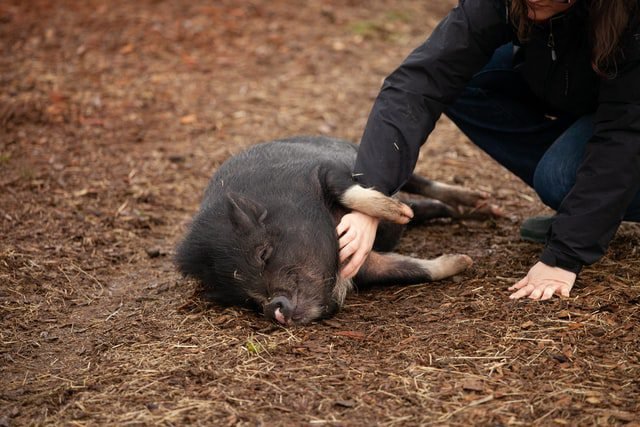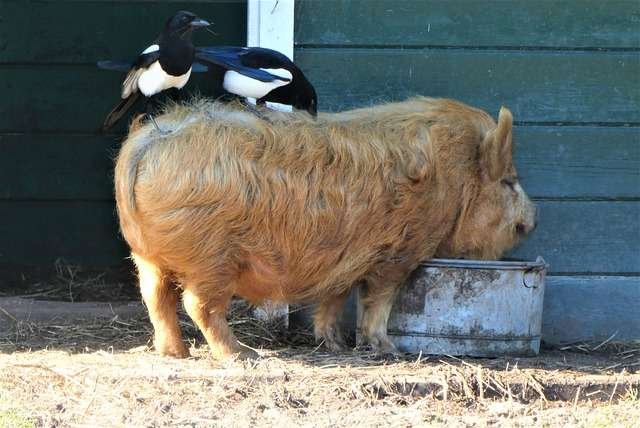Pigs can make great pets for the right type of people
Pigs are social, intelligent, and inquisitive animals and having one as a pet has become increasingly popular in recent years and many pig enthusiasts have bought “small” or “micro” pigs to live in their homes as companion animals.
Pigs can be amusing and gratifying company due to their intelligence and friendly nature, not to mention how adorable they are. Pigs can be housebroken, led around, and even taught simple tricks.

Pigs are intelligent enough to be trained in the same way that dogs are however, anyone considering getting a pet pig should do their research beforehand and examine the benefits and negatives objectively and honestly.
When a new Pet Pig Parent takes on this duty without all of the necessary information, a pig’s health can be jeopardised. Unfortunately, there are far too many cases where initially well-intentioned owners were unable to meet the animals’ complicated needs, and their Pet Pigs became rescues. As a result, please do your homework before deciding to keep a pig as a pet.
Pigs can make great pets for people who have the necessary room and resources and owning one can be quite rewarding. Despite the fact that there is no such breed as a “miniature pig,” several breeds are far smaller than the average domestic pig, making them attractive as pets. Pigs sold as “micro” are frequently potbellied pigs, although many other breeds can be bred tiny enough to be sold as “teacup” or “miniature.
Even if you’ve done all of your research, know exactly what type of Pet Pig you want, and are convinced you’d be a fantastic Pet Pig Parent, there may be a few hoops you need to jump through before you can legally own a pig as a pet. Unfortunately, even in remote locations, many local, state, and federal governments will not allow people to keep pigs as pets in their backyards.
As a result, the first step is to contact any and all government offices to determine whether there are any regulations governing pig-keeping and whether there are any conditions you must meet before applying for a licence/permit. It seems that the same regulations that apply to commercial piggeries also apply to pet pigs. In order to safeguard the livestock industry against diseases like foot-and-mouth disease.
Pigs for pet ownership should be obtained from reputable pet pig breeders. Although it is not an exact science because some pigs will outgrow their parents, be sure to ask to see the parents as this will provide a good indication what the pig’s full size could be. Some countries will set import restrictions on specific breeds of miniature pigs, so it’s a good idea to track down if your country has an organisation that can assist you in finding a certified breeder of legal miniature pigs.
Pigs can be housed indoors or outdoors, they don’t need much in the way of accommodation and like dogs, they can be housetrained. Indoor pigs will require their own space, ideally a room of their own with a blanket nest. In order to exercise and exploit their innate instinct to hunt for roots and fungi, they will also want access to an outside run.
Pigs kept outdoors will require a basic shelter, which could be a brick or wooden structure erected for the purpose or even just a portion of a water tank with some straw inside. Pigs love to nest, therefore you should offer them blankets inside or outside made of straw or sawdust.
Pigs are sensitive to the sun, so they will also need cover and enjoy a place where they can take a mud or dirt bath. Pigs can’t sweat, thus they overheat fast in hot weather, hence shade and a bath are necessities. Make sure your fence is strong. Pigs will consume nearly anything. They will forage for roots and fallen fruits, and they will need cereals like wheat, barley, or oats. They also like apples, kale, and root vegetables like turnips. You can give them kitchen leftovers of fruits and vegetables that would otherwise be composted. To give protein, small amounts of beans, peas, or lupins can be offered.
As an alternative, you can feed your speciality pigs pig feed from a rural feed source, which will satisfy all of their nutrient requirements. All pigs require access to fresh, clean water, but they may attempt to topple the container to create mud for wallowing, so choose a heavy one. A veterinarian should de-sex pet pigs. Boars who have not been de-sexed will be aggressive, restless, and stinky. Un-desexed sows will go into heat every three weeks and become restless, noisy, and irritable. Consult your veterinarian about de-sexing and immunizations. Additionally, pigs require annual de-worming and hoof trimming.

Pigs need a lot of mental activity to avoid becoming bored and destructive. If you have the room, you might want to think about getting two pigs so they have companionship when you’re not home. Pigs enjoy being around people and appreciate attention, scratches, and belly rubs. Although they are quite amiable creatures, pigs have a tendency to become territorial, so keep an eye on this behaviour and try to discourage it while the pigs are still young. Food rewards are especially powerful. Pigs can be trained to wear a leash or harness, learn tasks like sitting or whirling, and use a big litter box. They can even learn their name extremely rapidly. They value consistency in their daily lives.
Pigs enjoy using their snouts to dig for yummy treats such as truffles, roots, and grubs. You probably already know about this practise if you are a pet pig owner with a vegetable garden. It’s bad news for your gardens and lawns when they use their snout in that manner, a practise known as “rooting.” Pigs have a strong innate urge to use their snouts for digging, but nose rings appear to be able to control this urge.
Pigs may be quite destructive due to their curiosity and need to explore their surroundings, seek food, and gnaw on objects. Pigs may not be the best pet if you want to keep your backyard landscape immaculate. If you keep your pig indoors, destructive tendencies can also develop. You should also be aware that when pigs are excited, such as when they are expecting food, they will let you know loudly with grunts and squeals.
Who can honestly say they didn’t notice your allergies flare-up in your eyes at the end of Babe?
That incredibly touching moment where that cute little fella takes his place alongside the farmer and the farmer looks down, smiles and says, “That’ll do Pig, that’ll do.”


[…] CAN PIGS MAKE GOOD PETS? […]